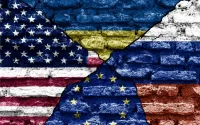By Elizabeth BryantUNITED PRESS INTERNATIONALJuly 21, 2005
PARIS -- Blazing summer temperatures across Europe, which already are being blamed for wildfires and a rash of health problems, now are threatening to diminish the region's agricultural output. Above-normal temperatures and droughtlike conditions have sunbathers packing the beaches from Brittany to the Cote d'Azur, but French farmers are mainly wringing their hands. A report published late last week by the Brussels-based European Commission said cereal production across the European Union is expected to drop 10 percent this year, compared with 2004. Water rationing is in place across half of France, and weather specialists don't see the situation improving in the foreseeable future. "Even if the rest of the summer is rainy, we'll have a hard time building the water reserves back up," Nicole Bourdette, an analyst at the state weather station, Meteo France, told Liberation newspaper. "The drought is persisting and will likely get worse." France so far has avoided the searing temperatures that led to about 15,000 heat-related deaths of 2003, and the country is faring better than other parts of Europe. In Spain, 11 volunteer firefighters were killed last weekend as they tried to stop a blaze in the country's Guadalajara province, while drought is reported to be threatening the livelihoods of about 70,000 families in the prime agricultural region of Murcia. Although the region uses water-saving drip irrigation, it risks losing half of its agricultural production, local officials say. Elsewhere in Spain, dams are at their lowest levels in years, swimming pools are dry and many villages are rationing water. In the case of Murcia, the drought has become politicized. The local head of Spain's opposition Popular Party has accused the socialist government of Prime Minister Jose Luis Rodriguez Zapatero of bad water management. The drought also extends to neighboring Portugal, where analysts estimate 64 percent of the country is affected and wildfires have devastated large areas. The country's forestry service says 20 percent of Portuguese forests have been burned over the past five years. "My animals usually eat straw during this season," Portuguese farmer Jose Antonio Palma said in published remarks. "But look, there's nothing. There's no wheat because it hasn't rained. Everything is lost." Portugal's Agriculture Ministry says it has earmarked about $42 million in disaster funds to cushion the effect of the drought. The government also will import 400,000 tons of wheat from Hungary for use as animal feed. Some analysts are citing the drought as evidence of global warming, noting that European temperatures have inched up by nearly 2 degrees Fahrenheit over the past century. In Eastern Europe the problem this summer is too much rainfall, not too little. Romania and Bulgaria have had so much rain that large tracts of land in both countries are submerged.






